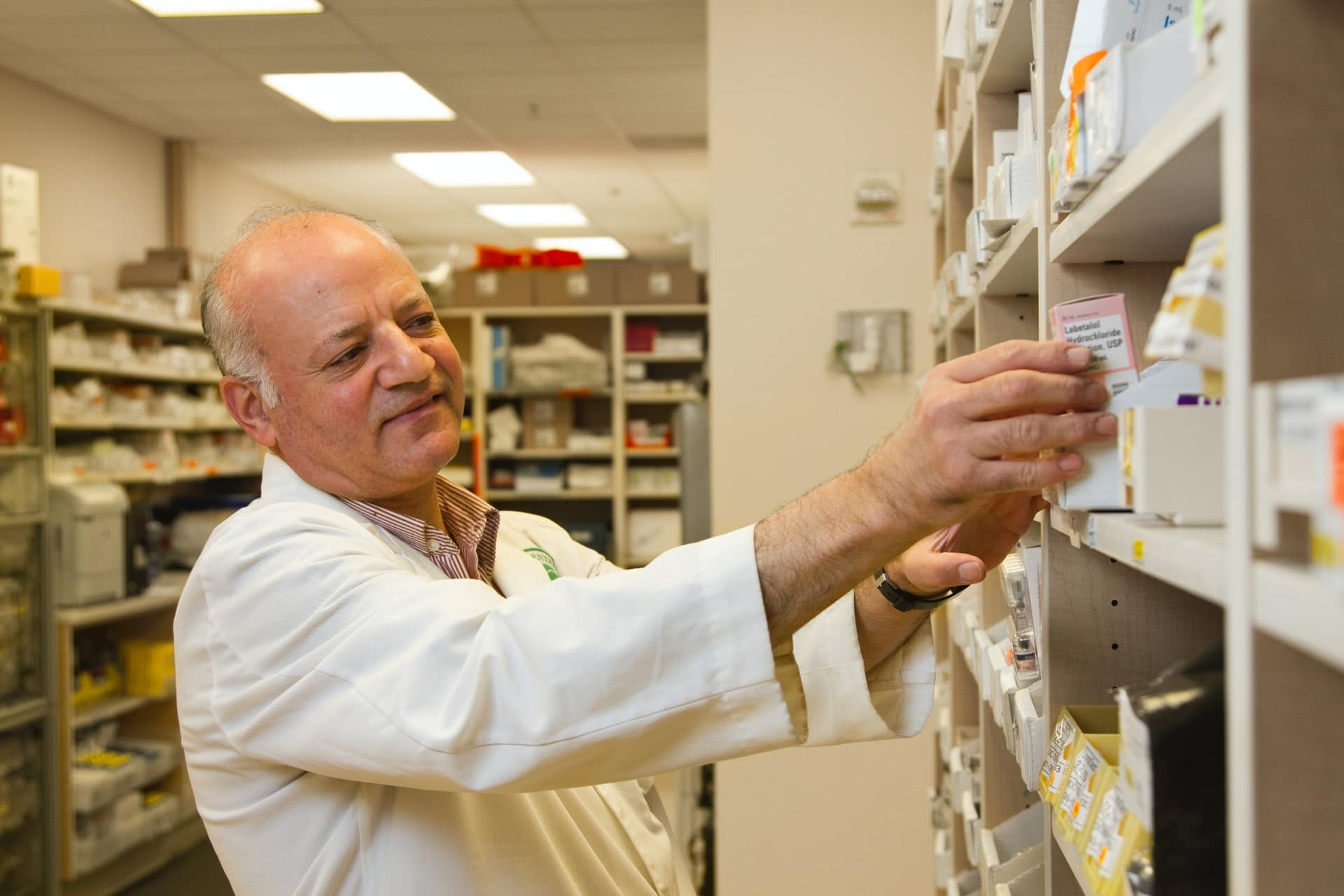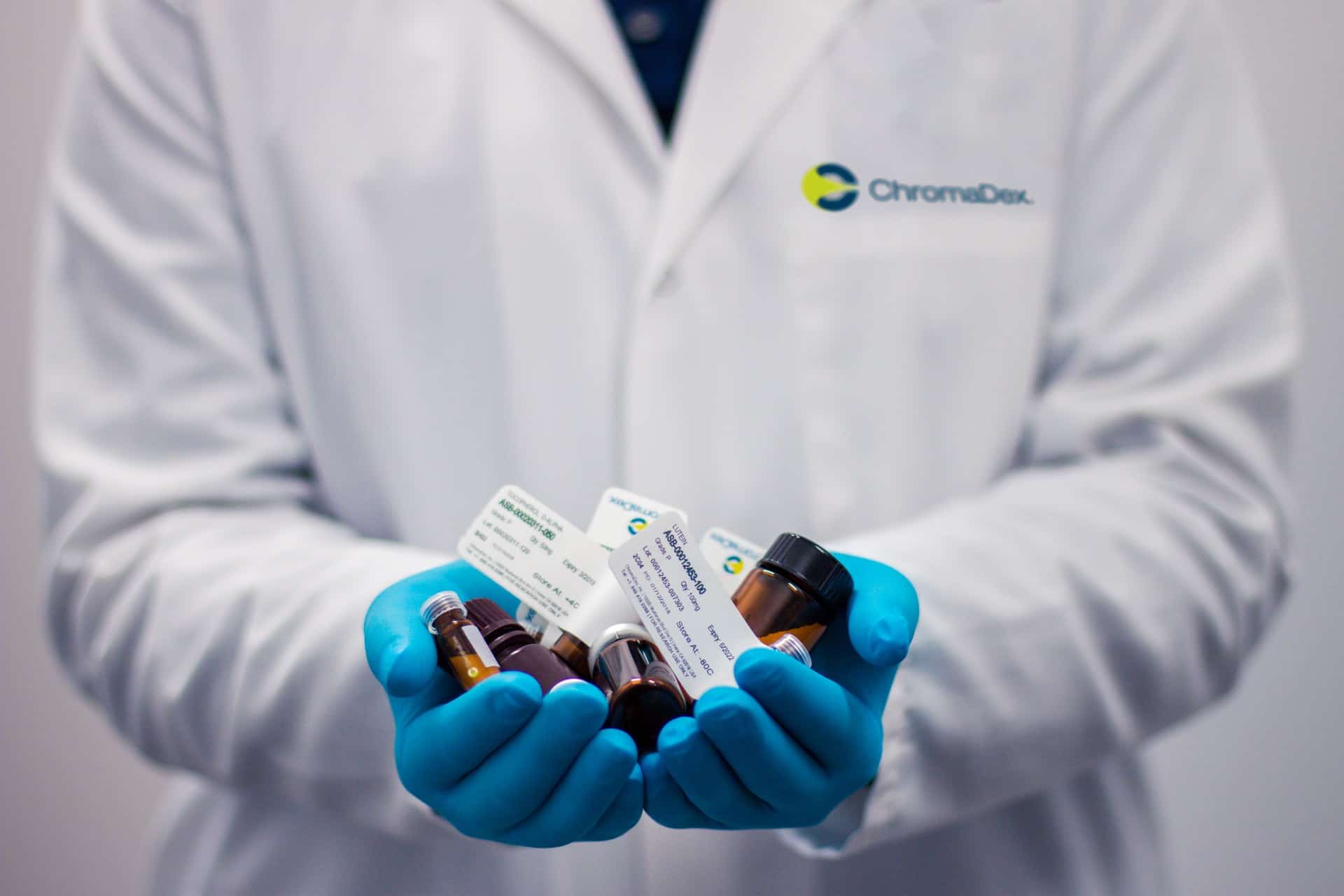How To Become A Pharmacist: Your Next Career In Healthcare
Updated: February 8, 2024
Published: April 25, 2021

The field of healthcare is lucrative, demanding, challenging, and rewarding. Best of all, it represents a growing industry in which there are many ways to get involved. If you have interest in how medications work together and help ensure people take them correctly, then you may look for how to become a pharmacist.
The road to becoming a pharmacist is filled with degrees and licensure. We’ll tell you everything you need to know about how to become a pharmacist and other related positions that share similarities.
What is a Pharmacist?
Pharmacists are responsible for dispensing medication to patients. They also hold the expertise to understand how prescriptions work with one another and what is safe to prescribe. Pharmacists ensure that patients know how to take their prescribed medicines, as well as offer support in knowing which over-the-counter (OTC) medicines can help treat ailments.
In most cases, a pharmacist receives a prescription from a physician and then prepares the necessary medication. A pharmacist is also responsible for reviewing that the medication being prescribed is safe and effective to treat the patient’s needs. If a pharmacist is prescribing an OTC medication, then they could be the first point of contact that the patient has.
Pharmacists can work in retail pharmacies, hospitals, and healthcare facilities — we’ll get more into that later.
Along with dispensing medicine and providing advice to patients, pharmacists can also be responsible for the following job duties:
- Administering vaccinations
- Overseeing pharmacy technicians and assistants
- Testing customer’s blood sugar and cholesterol
- Running screenings for conditions like high blood pressure, asthma or diabetes
- Providing information to patients about general health like getting enough exercise, managing stress or quitting smoking
- Performing administrative duties like updating health records, restocking shelves, and filing documents
- Filling out insurance forms and submitting paperwork
Additional Positions Related to Pharmacists
If you’re looking down the path of becoming a pharmacist, you will come across the two related positions of pharmacy assistant and pharmacy technician. Here’s a quick view of what these roles entail.
Pharmacy Assistant
A pharmacy assistant may just need a high school diploma and some on-the-job training. With less education than their counterparts in the pharmacy, their duties are more administrative with less responsibilities of technicians and pharmacists. Their role includes: recording medications that have been given, stocking shelves, and working behind the cash register.
Pharmacy Technician
A pharmacy technician undergoes specialized training to help pharmacists. In most states, they must earn a credential called the Certified Pharmacy Technician (CPhT). Along with drug tests and background checks, many pharm techs have an associate’s degree or certificate before they work on the job. In either a hospital or pharmacy, pharmacy technicians are integral to provide customer service, collect customer information, measure the right dose of medication, call doctor’s offices for refills, prepare intravenous medications, enter customer information into a database, package and label prescriptions, organize inventors, answer phone calls, and more. As you can see, a pharmacy technician is responsible for so many vital aspects of working in a pharmacy. Their roles continue to expand to take on more and more duties that pharmacists otherwise held.
Requirements: Types of Pharmacy Degrees
Depending on which position you want to hold in the pharmaceutical industry, you’ll have to face different educational requirements, outlined as follows:
- Assistant: An assistant needs at least a high school diploma or GED. If you’re still in high school, you may be able to apply for a pharmacy assistant position and learn on the job.
- Technician: To become a technician, you’ll need a certificate, high school diploma and/or an associate’s degree.
- Pharmacist: At the pinnacle of the pharmaceutical professions is a pharmacist, which requires the completion of a Doctor of Pharmacy (PharmD) degree from an accredited program.
How Long Does a PharmD Degree Take?
As mentioned, becoming a pharmacist requires a doctorate degree. So now you’re probably wondering, “How long does it take to become a pharmacist?”
The length of time it takes to complete the necessary requirements varies by each person’s situation and enrollment status (part-time versus full-time).
Put simply, it requires two years of your undergraduate degree to be dedicated to pharmacy-specific education, followed by four academic years (or three calendar years) of professional study in pharmacy school.
Beyond education in the classroom setting, you may need to complete residency/an internship and pass the licensure exam.
How to Become a Pharmacist
To make it more clear, let’s dive into the actual steps it takes for how to become a pharmacist.
1. Choose a Degree
Since there’s no specific degree called “pharmacy,” most students choose an undergraduate degree that is somewhat related to the field. While it’s only necessary to earn an associate’s degree (2 years), some students may want or already have a bachelor’s degree (a 4-year undergraduate degree). Students on this career path should choose a pre-med track, or a degree like physics, chemistry, math, biology, or anatomy. This will provide students with the foundational educational knowledge that will be applicable on the job. Pursuing a specialized certificate program in health science can prove to be highly beneficial.
2. Take a College Admissions Test
After earning an undergraduate degree, students may have to take a college admissions test like the GRE to apply to pharmacy school. They will also have to fill out an application and be admitted.
3. Complete Pharmacy School
Students must be accepted and enroll in a pharmacy school that is accredited by the Accreditation Council for Pharmacy Education (ACPE). Once the program is completed, students earn their Doctor of Pharmacy (PharmD) degree. The coursework is filled with the science of drugs, including: how drugs work in the body, absorption rates of drugs, biopharmaceuticals, toxicology, laws about prescription management, and more. At the same time of earning their degree, students may undergo practical training alongside licensed pharmacists.
4. Fulfill a Residency or Internship Program
During graduate school, students may opt to complete training through an internship or residency program. For residency placements, the American Society of Health-System Pharmacists place students after applying through the Pharmacy Online Residency Centralized Application Service.
5. Apply for a License
After fulfilling the aforementioned educational requirements, students must have a state license to practice. To obtain a license, you must pass the North American Pharmacist Licensure Examination (NAPLEX). In some states, students may also have to pass the Multistate Pharmacy Jurisprudence Exam (MPJE), which is about pharmacy law. Regardless of what state you want to work in, you’ll also have to complete a certain number of hours of practical experience to apply for a license, along with passing a background check.
6. Can I Become a Pharmacist in Less Time?
Like many graduate programs, there are accelerated program options. Three-year PharmD degree programs are available for students who have fulfilled all undergraduate requirements. Here’s a look at the requirements.
7. Expected Salary for Pharmacists
When you start working as a pharmacist, your salary will be dependent on several factors, including where you work, your experience level, the location of your employer, etc. Yet, the Bureau of Labor Statistics reports that in 2019, pharmacists earned a median salary of $128,090 per year. This works out to $61.58 per hour.
Where Do Pharmacists Work?
Pharmacists are in demand in a variety of work environments. These are some of the most common employers of pharmacists, pharmacist assistants, and pharmacist technicians:
Hospital Pharmacies
Pharmacists in hospitals work to prepare medications for patients. In this setting, a pharmacist will consult with doctors and nurses, ensure the accuracy of prescription dosages, and even prepare injections and IV bags. In most cases, pharmacists in this setting work closely with pharmacy technicians.
Retail Pharmacies
All three job titles are employed by retail pharmacies like CVS and Walgreens, to name a few. Other types of retail pharmacies include those available in grocery stores, independent pharmacies, and mail-order pharmacies. This group is the largest employer of pharmacists.
Research Labs
Research labs exist to test the effectiveness of drugs and also to develop new treatments. For pharmacists looking to work in this high research environment, additional certifications may be required.
Government and Military
The military has pharmacists on-site in its facilities to conduct wellness programs and help to educate the population about health conditions like diabetes and high blood pressure. Pharmacists also work in veterans care centers to manage medication.
Clinical Settings
Clinics may hire pharmacists to perform patient education, perform immunizations, test their cholesterol, and more. With the growing aging population, this employer may grow its need for pharmacists in the future.
Miscellaneous
Pharmacists may also be hired by private practices or as consultants to healthcare providers. Additionally, pharmacists may serve as teachers to educate pharmacy technicians.
With the wide range of employers for pharmacists, pharmacy technicians, and assistants, the field offers a great deal of opportunity for those who fulfill the necessary educational and certificate programs.
What Skills Do I Need to Become a Pharmacist?
Like any profession, what works for one person may not be the right fit for another. However, if you find yourself interested in becoming a pharmacist, there are some skills that bode well for a career. These skills include:
Interpersonal Skills
Pharmacists work closely with patients, doctors, healthcare professionals and their colleagues to make sure that patients are receiving exactly what they need. So, if a doctor makes a mistake and a pharmacist has to be the person to question a doctor, they need to know how to communicate the issue in a proactive solution-oriented way. Additionally, pharmacists often consult with sick patients, so they must be able to demonstrate empathy, understanding, and strong listening skills.
Multitasking Abilities
Pharmacists have to know how to manage a lot of moving pieces at once. In any setting, they may be answering phones while entering information into a database and communicating with a patient. The ability to switch between tasks efficiently and remain focused must be possible for you to handle.
Accuracy
There are many jobs you can have that won’t entail life or death situations, but pharmaceuticals is not one of them. The accuracy needed for this position literally can be the difference between life and death, so it’s absolutely necessary that a pharmacist pays high attention to detail and dispenses medicine exactly as prescribed.
Integrity
Since pharmacists receive prescriptions from doctors, they must be able to oversee that the prescription and blend of medications is right for the patient. If something might have been missed, it’s up to the pharmacists to question it and ensure everything is right to be given to a patient. This requires an enormous amount of integrity to uphold the duties of the role.
Health Sciences are in High Demand
Pharmacists represent just one career opportunity in the field of healthcare that makes a dramatic difference in the lives of others. If you find yourself unsure about this exact field, but you know that you want to enter the healthcare industry, it may be worthwhile to look at a general Health Science degree.
The flexible and interdisciplinary degree opens the door for many careers, including working in diagnostics, support, therapy or biotechnology, to name a few.
At University of the People, you have the unparalleled opportunity to earn a degree in Health Science online and tuition-free to get you started in your career in healthcare!
The Bottom Line
The path to becoming a pharmacist is a straightforward list of steps that must be completed. As straightforward as the process is, actually completing the steps will require utmost dedication and perseverance because it does become challenging. But, like anything that is challenging, the reward of helping people and being a major contributor to individuals’ overall health makes it all worth it!
Now that you can answer the question of: “How many years does it take to become a pharmacist?” you also have the information needed to know everything it entails and what you come out able to do after all the years of studying.



